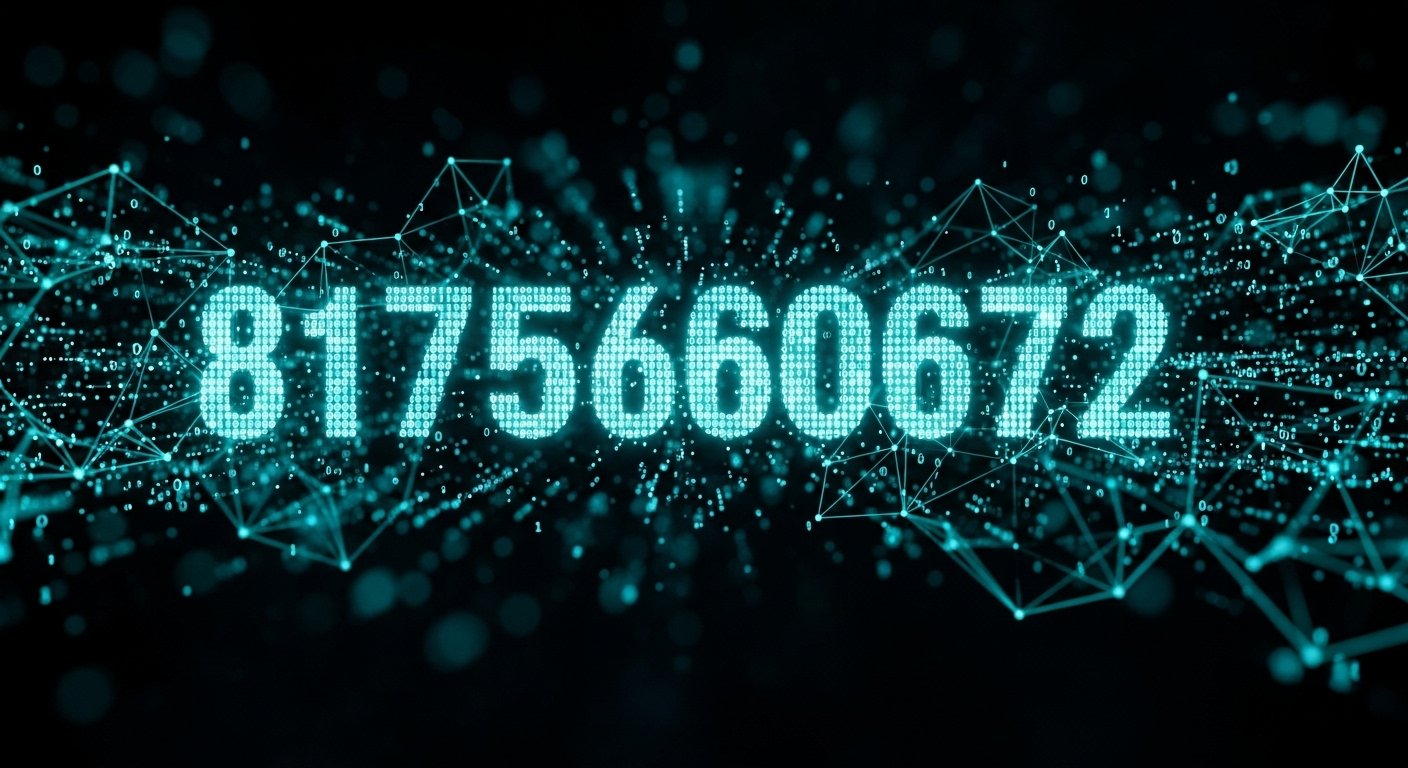In our hyper-connected world, we are surrounded by a constant stream of numbers. Phone numbers, passcodes, serial numbers, and IP addresses are the lifeblood of modern communication. But every so often, a specific sequence emerges from the noise, capturing curiosity and sparking questions. The number 8175760672 is one such sequence. It appears simple—just ten digits—yet it holds an air of mystery. What does it represent? Is it a simple phone number, a hidden code, a glitch in the matrix, or something else entirely?
This article is a deep dive into the potential identities and meanings behind 8175760672. We will explore the most logical explanations, venture into the realms of speculation, and provide you with the tools to understand such digital curiosities. Our journey will take us through telecommunications, online security, and even the psychology of pattern recognition. By the end, you may not have a single, definitive answer, but you will have a comprehensive understanding of the many faces a number like this can wear.
The Most Logical Explanation: A Phone Number
The immediate and most straightforward assumption for any ten-digit sequence in the U.S. and many other countries is that it is a telephone number. Let’s break down 8175760672 from this perspective.
The Area Code: 817
The first three digits, 817, are a valid North American Numbering Plan (NANP) area code. This area code is assigned to a region in northern Texas, primarily serving the city of Fort Worth and surrounding areas like Arlington, Grapevine, and Euless. So, if this is a phone number, it is geographically linked to the Dallas-Fort Worth metroplex.
This geographical clue is our first solid piece of data. It tells us that if you are receiving calls or seeing references to this number, it likely originated from or is associated with that part of Texas.
The Central Office Code and Line Number
The next three digits, 576, form the central office code or prefix, which narrows down the location to a specific telephone exchange within the 817 area. The final four digits, 0672, are the line number, identifying the specific subscriber.
When viewed as a whole, 8175760672 fits the standard format perfectly. This makes the “phone number” theory the strongest and most probable.
But Who Owns It?
This is where the mystery deepens. A simple search for this number does not yield a publicly listed business or individual. There are several reasons for this:
-
Unlisted Personal Number: The number could belong to a private individual who has chosen to keep their information out of public directories.
-
Business Landline: It might be a dedicated line for a specific department within a large corporation, which wouldn’t be listed publicly.
-
Mobile Phone: The vast majority of mobile numbers are not published in traditional phone books or online directories.
The Darker Side: Potential for Scams and Spam
In today’s digital landscape, any unknown number must be viewed with a degree of caution. The prevalence of robocalls, phishing attempts, and telephone scams is immense. Could 8175760672 be involved in such activities?
Common Scam Number Red Flags
While we cannot definitively label this number as malicious without current user reports, we can look for patterns associated with scam numbers:
-
Unfamiliarity: You don’t recognize the number, and it’s not associated with any business you have dealings with.
-
Single Ring and Missed Call: A classic tactic, especially from international scammers, is to call once and hang up, hoping you will call back and incur high charges.
-
Pre-recorded Messages: If you answer and hear a robotic voice talking about your car’s extended warranty, a free cruise, or problems with your Social Security number, it’s almost certainly a scam.
-
Spoofing: It is trivially easy for scammers to “spoof” their caller ID, making it appear that a call is coming from a legitimate area code (like 817) to gain your trust. The number 8175760672 could be a victim of spoofing itself, meaning a scammer is using it as a mask.
What to Do If You Encounter This Number
If you receive a call from 8175760672, the best course of action is caution.
-
Do Not Immediately Call Back: If it’s important, the caller will likely leave a voicemail.
-
Screen the Call: Let it go to voicemail and listen to the message. A legitimate caller will identify themselves and state their business.
-
Search Online: Look for recent user reports on sites like [redacted], [redacted], or [redacted]. If it’s a known scam number, you will likely find a community of people reporting similar experiences.
-
Block the Number: If the call is unwanted, use your phone’s built-in feature to block the number from contacting you again.
Beyond the Phone: Other Digital Identities
While the phone number theory is dominant, a ten-digit number can serve many other purposes in our digital world.
An Account or Customer ID
Many companies use long strings of numbers as unique identifiers for their customers. Your bank account number, customer loyalty number, or utility account number might be ten digits long. 8175760672 could theoretically be an account number for a resident or business in the 817 area code.
A Serial Number or Model Code
In manufacturing, serial numbers are used to track individual units of a product. A ten-digit serial number is very common for electronics, appliances, and industrial equipment. Similarly, it could be a model number for a specific component or product.
A Code in Programming or Data
In the world of software, numbers are the fundamental building blocks. 8175760672 could be:
-
A unique identifier in a database for a user, transaction, or piece of content.
-
A hard-coded constant in a piece of software for a specific function.
-
A timestamp representing a specific date and time, calculated as the number of seconds from a fixed point (like the Unix epoch).
The “Meaning of Numbers” and Synchronicity
For some, seeing a recurring number sequence is more than a coincidence; it’s a sign. This falls into the realm of numerology and synchronicity—a concept introduced by psychologist Carl Jung, referring to meaningful coincidences that seem to have no causal relationship.
If you keep seeing 8175760672, you might be tempted to find a deeper meaning. Numerologists would break the number down. One common method is to find its “root number” by adding all digits together until a single digit remains:
8 + 1 + 7 + 5 + 7 + 6 + 0 + 6 + 7 + 2 = 49
4 + 9 = 13
1 + 3 = 4
The root number would be 4. In numerology, the number 4 is often associated with stability, practicality, hard work, and building a solid foundation. It represents discipline, responsibility, and a strong sense of order.
From this perspective, repeatedly encountering 8175760672 could be interpreted as a message to focus on creating stability in your life, to get organized, or to apply diligent effort to your goals. Of course, this is a highly subjective interpretation, but it demonstrates how our minds seek patterns and assign meaning, even to random data.
The Power of Context: Where Did You See It?
The true meaning of 8175760672 is almost entirely dependent on the context in which you encountered it.
-
On Your Caller ID: It’s most likely a phone number, either from a legitimate source in Texas or a potential spam call.
-
On a Receipt or Invoice: It’s probably an order number, transaction ID, or customer account number.
-
In a Software Program or Log File: It’s almost certainly a unique identifier or a code of some kind.
-
Scribbled on a Note: Without context, it’s a mystery. It could be a phone number, a password hint, a locker combination, or anything else.
Always ask yourself: “Where did I see this, and what was happening around me?” The answer to that question is the key to decoding the number.
Conclusion: A Number of Possibilities
The sequence 8175760672 is a perfect example of a modern digital Rorschach test. Its meaning is not inherent but assigned by its context and its observer. Logically, it is a phone number from the Fort Worth, Texas area. Practically, it could be anything from a customer ID to a serial number.
In a world saturated with information, our brains are wired to find patterns and answers. When faced with an ambiguous string like this, we naturally try to solve the puzzle. Whether the solution leads you to a telemarketer, a database entry, or a moment of personal reflection is part of the journey.
The most important takeaway is to approach such mysteries with a blend of logical inquiry and cautious skepticism. Verify what you can, protect your personal information, and remain open to the fact that some numbers, for a time, may simply remain intriguing enigmas.
Frequently Asked Questions (FAQs)
1. Is 8175760672 definitely a phone number?
While it perfectly matches the format of a U.S. phone number with the 817 area code (North Texas), it is not definitively only a phone number. It could also function as an account number, serial number, or other unique identifier in a different context.
2. Should I call 8175760672 back if I miss a call from it?
It is not recommended to call back an unknown number immediately. Always let unknown calls go to voicemail first. A legitimate caller will leave a message stating their name and reason for calling. Calling back a potential scam number can confirm your number is active and lead to more unwanted calls.
3. What does the 817 area code mean?
The 817 area code is a geographic code in the North American Numbering Plan. It primarily covers the city of Fort Worth, Texas, and its surrounding suburbs, including Arlington, Grapevine, and Bedford.
4. Can a number like this be used for scams?
Yes. Scammers often use spoofing technology to make their calls appear to come from a legitimate local area code, like 817. The number you see on your caller ID may not be the scammer’s real number. Always be cautious with unsolicited calls.
5. I keep seeing 8175760672 in different places. What does it mean?
This is a phenomenon known as the Baader-Meinhof effect or frequency illusion. Once you notice something for the first time, you start seeing it everywhere. It’s usually a cognitive bias rather than a meaningful pattern. However, if it’s causing concern in a specific context (e.g., on your bank statement), you should investigate it directly with the relevant institution.

